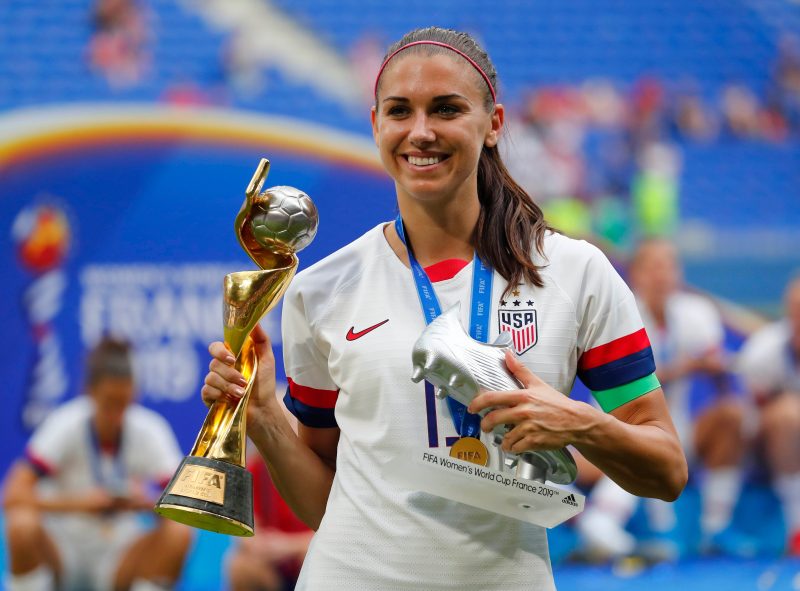
Alex Morgan retires, but her greatest legacy isn’t on the soccer field
Alex Morgan is the rare athlete whose impact off the playing field was as great as it was on it.
Maybe even greater.
Morgan, who announced her retirement Thursday, leaves the game as a two-time World Cup champion and Olympic gold medalist. She’s fifth on the U.S. women’s national team’s all-time scoring list, with only five of her 123 goals coming from the penalty spot. She was runner-up twice for FIFA’s Player of the Year, and third another time, and her six appearances on FIFPRO’s World XI is second-most in history.
More significantly, Morgan leaves women’s sports in a far better spot than they were when her career began. She was instrumental in the USWNT’s fight for equal pay and played a significant role in the NWSL’s first-ever contract. The league’s first anti-harassment policy was a direct result of her efforts. She helped spark the current investment boom in women’s sports, pushing sponsors and potential owners to recognize their growth potential.
She knew her star status gave her influence, and she used it for the greater good.
“Charlie came up to me the other day and said that when she grows up, she wants to be a soccer player,” Morgan said in her retirement announcement, referring to her young daughter. “It just made me immensely proud. Not because I wish for her to become a soccer player when she grows up, but because a pathway exists that even a 4-year-old can see now.
“We’re changing lives,” Morgan said, her voice choking. “The impact we have on the next generation is irreversible, and I’m proud in the hand I had in making that happen and pushing the game forward and leaving it in a place that I’m so happy and proud of.”
Morgan, now 35, didn’t set out to be a disruptor. She wanted to play soccer, a sport she’s loved for as long as she can remember. But very soon after joining the USWNT, she found herself cast as America’s sweetheart, inheriting the role Mia Hamm once had.
Soccer fans loved her ruthlessness — there’s more than a few opposing goalkeepers who still get the shakes at the memory of Morgan bearing down on them — and those who didn’t know much, or care, about the game were captivated by her wholesome good looks. At a time when tennis players and Olympians were the only women athletes to have any kind of commercial success, Morgan became an exception.
But rather than insulating her, Morgan’s privileged status brought the wrongs that existed into sharper focus. When Megan Rapinoe, Carli Lloyd, Becky Sauerbrunn and Hope Solo filed a wage discrimination complaint with the Equal Employment Opportunity Commission in 2016, Morgan joined them.
“I felt significantly younger and more inexperienced than” the others, Morgan told USA TODAY Sports last year. “I felt like, in that moment, that was an opportunity to learn, to get out of my shell and feel uncomfortable even when doing the right thing.
“And so I think that was a pivotal moment for me, in realizing this platform that I have and this opportunity that I have in front of me to be able to say something and have people listen.”
That complaint would be the precursor to the equal pay lawsuit, which the USWNT players filed three months before the 2019 World Cup. Morgan became the lead plaintiff, knowing her name and fame would draw more attention to the case and increase the pressure on U.S. Soccer.
Though she and Rapinoe were the public faces of the lawsuit, which resulted in a landmark contract in 2022, Morgan’s involvement went well beyond that. Becca Roux, executive director for the USWNT Players Association, recalled Morgan returning documents with edits and notes. She was an active participant in calls with attorneys and advisers.
But her activism wasn’t limited to equal pay. Once she found her voice, Morgan raised it for a variety of issues.
She was outspoken in support of racial equality and LGBTQ+ rights. She was a steadfast ally to Mana Shim, her then-teammate who reported an abusive coach, and when Shim’s story became public, Morgan was unflinching in her demands that both the NWSL and U.S. Soccer do more to protect players. Frustrated with the lack of coverage of women’s sports and women’s athletes, Morgan joined with Sue Bird, Chloe Kim and Simone Manuel to create Togethxr, a media and commerce company.
She also wrote a series of children’s books, The Kicks, that promote teamwork and positivity for young girls. And when critics called the USWNT “arrogant” during the 2019 World Cup for having the audacity to own their greatness, Morgan pushed back — hard — at the double standard and the misogyny behind it.
“I’m so proud of what I’ve done because of having Charlie and knowing that she isn’t going to have to fight the battles that I had to fight,” Morgan told USA TODAY Sports last year. “My hope is that I fight for it now so she doesn’t have to. She gets to just have fun. She gets to play. She gets to do what she loves without worrying about that.”
Morgan is one of the greatest to ever play the game, in this country or any other. But it’s the work she did to level the playing field for the girls and young women who come after her, in soccer and every other sport, that make her a legend.
Follow USA TODAY Sports columnist Nancy Armour on social media @nrarmour.
